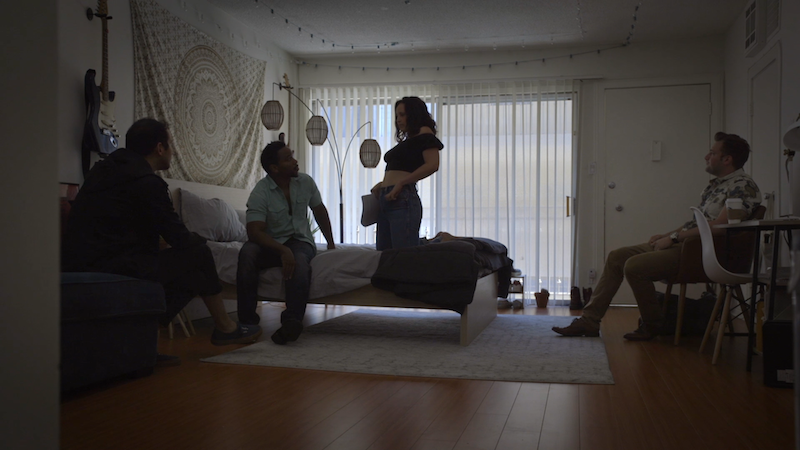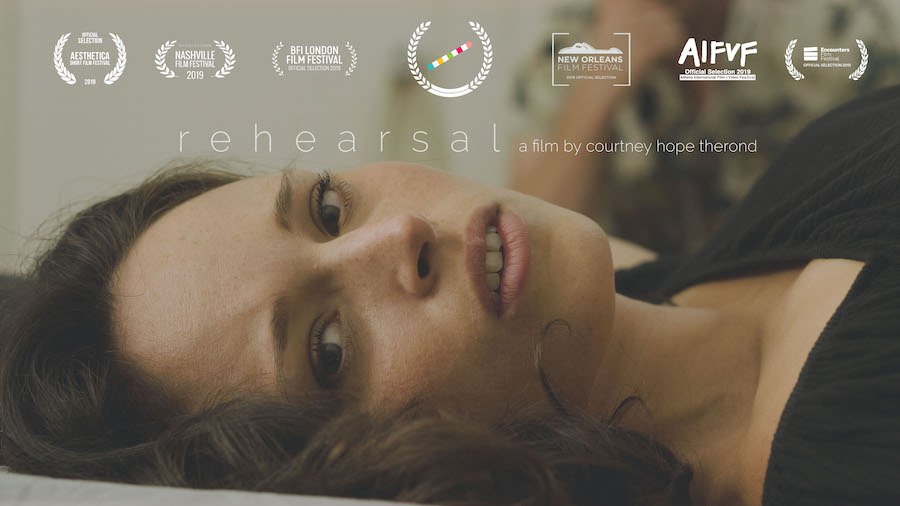Courtney Hope Thérond’s “Rehearsal” takes place in a small studio apartment where a film crew plots out camera angles to a sex scene that will be filmed the next day. The actors look understandably nervous, even more so when the director asks them to take their tops off, just so they can get a sense of what it will look like. The woman, played by Jessica Mendez Siqueiros, did not put a bra on that day and clearly has reservations about going topless in a room full of men, one of whom, the cinematographer (Alex Portenko), is taking pictures. “Do you see my boobs in the shot?” she asks. “Yes,” says the director (Alexander Chard). “But it’ll be really quick in the edit.”
“Rehearsal” takes place over the course of an afternoon when the actors supposedly have a day off from shooting. Thérond carefully underscores how overly nonchalant the crew are regarding the actor in their film who does not see any benefit in taking her top off for a shot rehearsal. The director, of course, has a feeble reason for it, but clearly does not possess the tools necessary to make the actors feel comfortable with the whole idea, valued and in on the process. One gets the sense that Thérond has seen this scenario play out way too many times in the indie world.
That’s what makes “Rehearsal” so compelling. Thérond is smart to show restraint in underlining everything that is happening here and instead lets the look on Siqueiros’ face do the storytelling. She is the only character in the film to get any kind of close-up or point of view, a smart choice on Thérond’s part as well as her cinematographer, Amanda Treyz, who also makes the right choice in never seeing what the cinematographer in the film sees. In fact, it’s often the opposite. This is about the actor here who feels outnumbered by all the bros surrounding her who seem well-intended, but inept when it comes to communicating with actors.
“Rehearsal” is the kind of short film that I love discovering. It’s tight, beautifully executed and acts as a springboard for many different discussions regarding the film industry, the workplace and sex in film. It reminds me of Catherine Breillat’s 2002 film “Sex Is Comedy,” in which a female director tries to film a sex scene between two actors who hate one another. The Criterion Channel could do well in pairing these two films together.

Q&A with director Courtney Hope Thérond:
Did this come from any particular experience on a set?
I worked as a first assistant director on a feature film in which the director handled the sex scene in a way that made the cast and crew uncomfortable. It was a different situation from what’s portrayed in “Rehearsal,” but similar in that there wasn’t one particular action taken that crossed a line, but rather a series of microaggressions. I wanted to explore these grey areas of consent in a film as a way to talk about how these boundaries are tested, because this is where these patterns of overlooking consent start. I hoped that in making “Rehearsal” I could better understand my own feelings about the situation and help start conversations about how to make a set a safer and more respectful environment.
The actor in the film, Jessica Mendez Siqueiros, had to do some nudity for this film, so what did you do for her that the director character in the film did not do?
Jessica and I worked together on my last short film “The Dress You Have On,” so we already had a working relationship. She was involved in “Rehearsal” from the beginning, coming on board to help produce the short.
We talked privately about how we were going to film each scene before the shoot and she and I had an open dialogue while filming. Having both agreed to what would be filmed and what would be seen before the day of the shoot made it a safer set, and removed the “peer pressure” element that’s so palpable in the rehearsal seen in the film. Jessica also edited the film, so she and I sat together to finalize the cut and what it would show. We also made a separate cut for our online release. Having her involved in the entire process and keeping the conversation open created the consent that’s lacking in the rehearsal scene.
What advice or guidance would you give to male directors in this position?
I don’t think it’s only male directors who cross the boundaries of consent on set. I think we’re all capable of overstepping that line. One thing that I feel is missing from the broader conversations about consent that have come to light since the start of the #MeToo movement are the subtle ways in which we test boundaries. It starts with making it a habit of asking permission to touch other people or enter their personal space. It’s asking questions about consent privately, rather than in front of fellow actors or the crew. It’s also important that we advocate for other people’s safety and well-being on set. It’s really all about asking people what they need to feel safe and not making assumptions. Open dialogue is free and not avoiding the subject because it’s uncomfortable.

Have you noticed any changes in the industry in regards to movies or scenes like this, where women don’t seem to have agency over what goes on in a scene or on a set?
I do see changes being made and I find that women are starting to feel more empowered in these situations. We still have a long ways to go, but it does seem like we’re moving in the right direction. Intimacy coordinators are becoming more common. Just the fact that consent is part of the broader conversation makes people more aware of their actions.
While screening “Rehearsal” at film festivals I’ve had a lot of people tell me personal stories about their own similar experiences and I’ve had a lot of people ask how to prevent these types of situations from happening in the future. I hope by having the film available to a wider audience online that it will inspire more of these conversations about how to move towards more consensual sets.
It must be an interesting creative challenge on the set to make a movie about rehearsing the making of a movie, and have it come off as real as possible. How did you and your actors go about collaborating on this?
Since so much of what happens in the film isn’t in the dialogue, but in the way the characters interact, the rehearsal process was key. It was also important to me that the male characters in “Rehearsal” didn’t come across as bad people so I wanted to make sure that each character was fully developed.
The actors, cinematographer Amanda Treyz, and I met over coffee to talk about the characters and the film that they’re rehearsing. It was a highly collaborative process that started with building each character’s backstory and how they came to work together on this feature.
We decided that the scene they were rehearsing on their day off—much to Jared’s (the DP) annoyance—was a scene the director added to give Ana (the actress) more screen time because she and James (the actor) had such great screen chemistry in the scenes they had already filmed. Their relationship was an assumed affair in the feature, but this scene would show how it developed and make the film “edgier.” It wasn’t something that was in the original script, but was something Ana saw as an opportunity because it gave her another major scene. We also decided that Ana was relatively new to acting and that this was her first leading role in a feature. Those details helped to compound the uncertainty she feels about whether this type of rehearsal is standard, and her fear of contradicting the status quo.
In the rehearsal process we determined that it was Jared and James’ idea to host the rehearsal in the first place, as a way to make Ana more comfortable with the scene. Everyone went into the rehearsal with good intentions, yet no one asked Ana what she needed to feel safe.
A lot of the realism in “Rehearsal” comes from the cinematography as well. Keeping so much of the film in the wide shots helps to create a “fly on the wall” experience that doesn’t hint at how the audience should feel.
What’s next for you?
I’m currently developing my first feature film and I’m always looking for new collaborators and projects. Updates and new work can be found on www.courtneytherond.com, or on Instagram @courtneytherond












